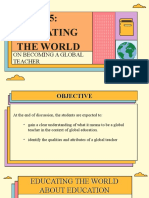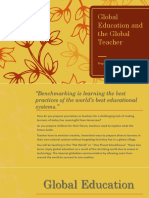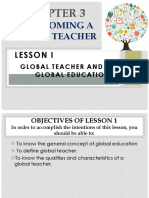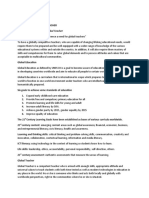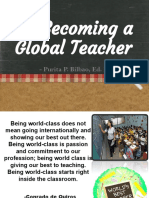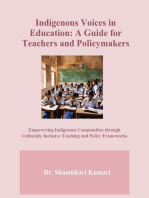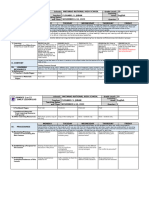0 ratings0% found this document useful (0 votes)
26 viewsModule 5
Uploaded by
epifaniopilapil48Copyright
© © All Rights Reserved
Available Formats
Download as PDF, TXT or read online on Scribd
0 ratings0% found this document useful (0 votes)
26 viewsModule 5
Uploaded by
epifaniopilapil48Copyright
© © All Rights Reserved
Available Formats
Download as PDF, TXT or read online on Scribd
You are on page 1/ 14
On Becoming a Global Teacher
Teachers in the global landscape need
to expand the scope of their viewpoint
beyond the normal boundaries of the local
classroom as they are building learners to
fit into the global society.
Learning Outcomes
After learning the lessons in this module, you are
expected to:
describe
global and glocal teachers and the
demands of the globalization in the 21st Century;
describethe characteristics of professional teachers
in the ASEAN and some other countries; and
explainthe life and career skills of teachers and
learners in the global landscape of the 21st Century.
The Global and Glocal Teacher
WHAT IS GLOBAL EDUCATION?
It is a goal to develop countries worldwide and is aimed at
educating all people in accordance with world standards. –
UNESCO
It is a curriculum that is international in scope which
prepares today’s youth around the world to function in one
world environment under teachers who are intellectually,
professional and humanistically prepared. -UNESCO
UNESCO’s Education 2030 Incheon Declaration
The World Education forum established a vision “Towards
inclusive and equitable quality educational lifelong
learning for all.” It proposes the Sustainable Development
Goal (SDG) 4 with seven outcome targets that must be
achieved by 2030.
To increase the supply of qualified teachers, through
international cooperation for teacher training in developing
countries, especially the least developed countries and
island developing states.
GLOBAL EDUCATION
a form of and approach to education that prepares students
for this rapidly interconnected new world.
being globally educated will allow students the opportunity
to not only gain a prestigious education but also a uniquely
multifaceted academic experience.
Through exposure to diverse systems, perspectives and
cultures, globally educated students understand the
inextricable links between the lives of individuals across the
world
GLOBAL EDUCATION
Learners understand the way each nation’s
economic, cultural, political and
environmental changes influence one another.
globally educated students possess the skills,
attitudes and values needed to thrive in this
new rapidly changing world.
21ST Century Learning Goals
1. 21st century content: emerging content areas such as
global awareness; financial, economic, business, and
entrepreneurial literacy; civic literacy; health and
environment awareness.
2. Learning and thinking skills: critical thinking and
problem-solving skills, communication, creativity and
innovation, collaboration, contextual learning,
information and media literacy.
21ST Century Learning Goals
ICT literacy: using technology in the context
of learning so students know how to learn.
Life skills: leadership, ethics, accountability,
personal responsibility, self-direction, others
21st century assessments: Authentic
assessments that measure the areas of learning.
FROM GLOBAL TEACHER TO GLOCAL TEACHER
PROFESSIONALS
WHAT IS A GLOCAL TEACHER?
A glocal teacher who is competent and armed with enough
skills, appropriate attitude and universal values to teach
learners at home or abroad but is equipped with both time
tested as well as modern technologies in education in any
time and any place in the world.
Is someone who thinks and acts both locally and globally with
worldwide perspectives, but is teaching in the communities,
localities, towns, provinces and regions where he or she is
situated.
Qualities and Attributes of Glocal Teachers
understand how this world is interconnected;
recognize that the world has rich variety of ways of
life;
have a vision of the future and sees what the future
would be for himself/herself and the students;
are creative and innovative;
understand, respect and tolerant of the diversity of
cultures;
Qualities and Attributes of Glocal Teachers
believe and take action for education that will sustain the
future;
facilitate digitally-mediated learning;
possess good communication skills (for Filipino teachers to
be multilingual);
aware of international teachers standards and framework;
and
master the competencies of the beginning teacher in the
Philippine professional standards for teachers (PPST, 2017)
Characteristics & Core Values of Glocal Teachers
Glocal Teachers must possess the following distinct characteristics
and core values of Filipino teachers: (Master Plan for Teacher
Education)
cultural and historical rootedness by building on the culture and the
history of the learners and the place;
ability to contextualize teaching-learning by using local and
indigenous materials content and pedagogy whenever appropriate;
excellence in personal and professional competence, leadership,
research, technology, innovation and creativity;
responsiveness through social involvement and service, learner-
centeredness, respect and sensitivity for diversity and inclusiveness;
Characteristics & Core Values of Glocal Teachers
accountability and integrity by being a positive role model with
strong moral character, committed and conscientious, credible,
honest, and loyal;
ecological sensitivity by being resilient and a steward of the
environment for sustainability;
nationalism/Filipinism by being a responsible citizen and
upholding the Filipino identity amidst globalization
(glocalization); and
faith in the Divine Providence by being humane, just, peace-
loving and respectful of human rights.
Teachers and the Teaching Profession in the
ASEAN and Beyond
ASEAN 10 member states : Brunei, Cambodia, Indonesia,
Lao PDR, Malaysia, Myanmar, Philippines, Thailand,
Singapore, and Vietnam.
You might also like
- Lesson 3:: The Changing Global Landscape For The 21 Century Teachers67% (3)Lesson 3:: The Changing Global Landscape For The 21 Century Teachers29 pages
- Scott Thornbury - Teaching+Listening PDFNo ratings yetScott Thornbury - Teaching+Listening PDF14 pages
- The Global and Glocal Teacher ProfessionalNo ratings yetThe Global and Glocal Teacher Professional4 pages
- The Global and Global Teacher ProfessionalNo ratings yetThe Global and Global Teacher Professional14 pages
- The Global and Glocal Professional Teacher1No ratings yetThe Global and Glocal Professional Teacher116 pages
- St. Anthony College Calapan City, Inc.: Information Sheet 1.9 On Becoming A Global TeacherNo ratings yetSt. Anthony College Calapan City, Inc.: Information Sheet 1.9 On Becoming A Global Teacher4 pages
- Module 10 The Global and The Glocal Teacher Professional Is There A DifferenceNo ratings yetModule 10 The Global and The Glocal Teacher Professional Is There A Difference5 pages
- Chapter 5 Lesson 1 2 On Becoming A Glocal TeacherNo ratings yetChapter 5 Lesson 1 2 On Becoming A Glocal Teacher80 pages
- Lesson I: Global Teacher and The Global Education100% (2)Lesson I: Global Teacher and The Global Education17 pages
- C Quilas LGEduc 6 Teaching Profession Semi FinalsNo ratings yetC Quilas LGEduc 6 Teaching Profession Semi Finals17 pages
- Prepared By: Jessel F. Galvez BSED TLE IVNo ratings yetPrepared By: Jessel F. Galvez BSED TLE IV16 pages
- UNESCO Defines Global Education As A Goal To Become Aware of Educational ConditionsNo ratings yetUNESCO Defines Global Education As A Goal To Become Aware of Educational Conditions2 pages
- The Globaland Glocal Teacher Professional Istherea DifferenceNo ratings yetThe Globaland Glocal Teacher Professional Istherea Difference2 pages
- Cream Purple Abstract Thesis Defense PresentationNo ratings yetCream Purple Abstract Thesis Defense Presentation10 pages
- On Becoming A Global Teacher: - Purita P. Bilbao, Ed. DNo ratings yetOn Becoming A Global Teacher: - Purita P. Bilbao, Ed. D20 pages
- Mastering the Art of Teaching: A Comprehensive Guide to Becoming an Exceptional EducatorFrom EverandMastering the Art of Teaching: A Comprehensive Guide to Becoming an Exceptional EducatorNo ratings yet
- Indigenous Voices in Education: A Guide for Teachers and PolicymakersFrom EverandIndigenous Voices in Education: A Guide for Teachers and PolicymakersNo ratings yet
- STS - MODULE5 - Technology Humanity and The Future PDF100% (1)STS - MODULE5 - Technology Humanity and The Future PDF15 pages
- Contemporary Learning Theories/Psychologists: Their Impact To Epp Teaching100% (1)Contemporary Learning Theories/Psychologists: Their Impact To Epp Teaching8 pages
- (Kusumadhani, 2015) - MATHEMATICS LITERACY BASED ON ADVERSITY QUOTIENT ON THE DISCOVERY LEARNING AND GUILFORD APPROACHNo ratings yet(Kusumadhani, 2015) - MATHEMATICS LITERACY BASED ON ADVERSITY QUOTIENT ON THE DISCOVERY LEARNING AND GUILFORD APPROACH6 pages
- SDLP 03 - Organization Theories and Applications100% (1)SDLP 03 - Organization Theories and Applications4 pages
- Contemporary Practice in Education Research Action Research Proposal Michael Allen - 110045956No ratings yetContemporary Practice in Education Research Action Research Proposal Michael Allen - 11004595619 pages
- Types of Paragraphs: What Are The Essential Characteristics of A Good Paragraph?No ratings yetTypes of Paragraphs: What Are The Essential Characteristics of A Good Paragraph?2 pages
- LCC November 2023 - January 2024 WeekendsNo ratings yetLCC November 2023 - January 2024 Weekends4 pages
- Detailed Lesson Plan No Kay Mater Revise 3No ratings yetDetailed Lesson Plan No Kay Mater Revise 322 pages
- Personal Profile:-: Contact No:-9505804093No ratings yetPersonal Profile:-: Contact No:-95058040932 pages
- Lesson 3:: The Changing Global Landscape For The 21 Century TeachersLesson 3:: The Changing Global Landscape For The 21 Century Teachers
- St. Anthony College Calapan City, Inc.: Information Sheet 1.9 On Becoming A Global TeacherSt. Anthony College Calapan City, Inc.: Information Sheet 1.9 On Becoming A Global Teacher
- Module 10 The Global and The Glocal Teacher Professional Is There A DifferenceModule 10 The Global and The Glocal Teacher Professional Is There A Difference
- UNESCO Defines Global Education As A Goal To Become Aware of Educational ConditionsUNESCO Defines Global Education As A Goal To Become Aware of Educational Conditions
- The Globaland Glocal Teacher Professional Istherea DifferenceThe Globaland Glocal Teacher Professional Istherea Difference
- On Becoming A Global Teacher: - Purita P. Bilbao, Ed. DOn Becoming A Global Teacher: - Purita P. Bilbao, Ed. D
- Mastering the Art of Teaching: A Comprehensive Guide to Becoming an Exceptional EducatorFrom EverandMastering the Art of Teaching: A Comprehensive Guide to Becoming an Exceptional Educator
- Indigenous Voices in Education: A Guide for Teachers and PolicymakersFrom EverandIndigenous Voices in Education: A Guide for Teachers and Policymakers
- STS - MODULE5 - Technology Humanity and The Future PDFSTS - MODULE5 - Technology Humanity and The Future PDF
- Contemporary Learning Theories/Psychologists: Their Impact To Epp TeachingContemporary Learning Theories/Psychologists: Their Impact To Epp Teaching
- (Kusumadhani, 2015) - MATHEMATICS LITERACY BASED ON ADVERSITY QUOTIENT ON THE DISCOVERY LEARNING AND GUILFORD APPROACH(Kusumadhani, 2015) - MATHEMATICS LITERACY BASED ON ADVERSITY QUOTIENT ON THE DISCOVERY LEARNING AND GUILFORD APPROACH
- Contemporary Practice in Education Research Action Research Proposal Michael Allen - 110045956Contemporary Practice in Education Research Action Research Proposal Michael Allen - 110045956
- Types of Paragraphs: What Are The Essential Characteristics of A Good Paragraph?Types of Paragraphs: What Are The Essential Characteristics of A Good Paragraph?




















